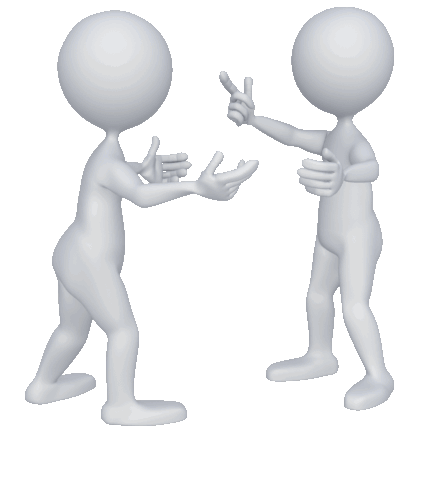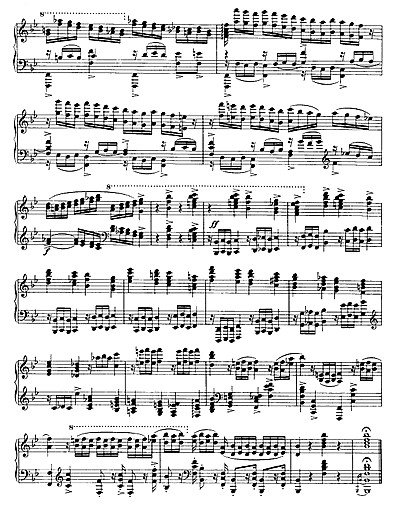
If you haven’t read my previous post, Four Chairs Lesson Part I – Introduction, I strongly urge you to do that now before reading this post. Since it is the beginning of the Four Chairs message, it will set the stage for this post.
As a review, in my previous post, I asked the congregation at Calvary Baptist Church of York to focus their attention on the cross on the sanctuary’s front wall. I suggested that the two timbers of the cross could represent two fundamental questions:
- Have you made a commitment to Christ as your personal savior?
- Have you explored, really explored what it means to accept Christ as your Lord?
I then urged people to visualize the wall disappearing and a bright light appearing above and behind the cross. Such a light would cast an ominous, cross-shaped shadow on the sanctuary floor. This shadow divided the sanctuary into four sections. Before the service, I had placed an empty chair in each of these four sections, from whence this lesson gets its title, Four Chairs.

Picking up where I left off, I presented the Identity Status model of the psychologist James Marcia and how it interacted with the four quadrants of the cross.
The lower left-hand group, Quadrant 1, are those who have not accepted Christ as their savior. They have also not thoroughly examined any alternatives.
Every single individual in the world started in this chair. As young children, we did not have the mental awareness to really understand and choose Christ.
If you grew up in an American, Protestant church like Calvary Baptist Church of York, you most likely had the privilege of hearing the gospel many times. At those times, you had the choice of receiving Him as your personal Savior or not. If you didn’t accept Him, you remained in Chair 1.
Many individuals around the world have heard the gospel. Thus, they had the option to accept or reject the claims of Christ. If they reject His claims and leave it at that point, they also remain in Chair 1.
What happens if individuals have not heard the gospel? Would a loving God condemn such individuals? The Apostle Paul definitely answers this dispute in his letter to Roman Christians.
“For the wrath of God is revealed from heaven against all ungodliness and unrighteousness of men, who hold the truth in unrighteousness; Because that which may be known of God is manifest in them; for God hath shewed it unto them. For the invisible things of Him from the creation of the world are clearly seen, being understood by the things that are made, even His eternal power and Godhead; so that they are without excuse: Because that, when they knew God, they glorified Him not as God, neither were thankful; but became vain in their imaginations, and their foolish heart was darkened. Professing themselves to be wise, they became fools, and changed the glory of the uncorruptible God into an image made like to corruptible man, and to birds, and fourfooted beasts, and creeping things. Wherefore God also gave them up to uncleanness through the lusts of their own hearts, to dishonor their own bodies between themselves: Who changed the truth of God into a lie and worshiped and served the creature more than the Creator, who is blessed forever. Amen.” (Romans 1:18-25, KJV)
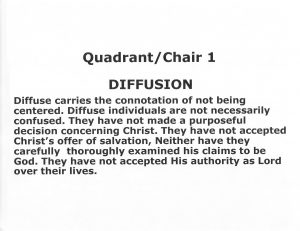
Returning to Marcia, he labeled individuals in Quadrant/Chair 1 DIFFUSE. The word diffusion means spread out, not concentrated nor centered. This word should not be confused with the word “confusion.” These individuals are not necessarily confused. They have just not chosen to make a commitment to Christ nor to critically examine alternatives, as explained in Slide 10.
As I take a seat this morning in Chair 1, I see an interesting fact. I see only two viable paths out of this chair. I can climb up the steps to the chair we will call Chair 2, or I can slide across the sanctuary floor to the chair we will call Chair 3.
To get to the remaining chair, Chair 4, diffuse individuals seated in Chair 1 must go through the intermediate stages of Chair 2 or Chair 3. There is no direct path from Chair 1 to Chair 4. Today, such a path is blocked by the pulpit. While this may not be the best analogy I could use, people sitting in Chair 1 cannot go directly to Chair 4. Later in my message, I will explain the potential paths to Chair 4.
If we consider the horizontal timber of the cross, or its shadow, the process of actively considering the claims of Christ and alternatives, then Chair 2 can be seen as a seat for those seeking answers. Marcia considered this position temporary and gave this status the label “MORATORIUM”.
Marcia’s use of this word may be considered odd because the word usually denotes inactivity or a postponement of work. Marcia used the word simply to imply the lack of a decision, instead of lack of physical activity. Marcia saw these individuals as being highly active mentally in seeking the best alternative for themselves. Marcia’s students have labeled these individuals “SEEKERS”.
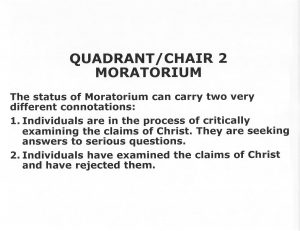
More recent studies have identified two kinds of individuals in Chair 2. These two types are described in Slide 11. The first type is Marcia’s seekers. If individuals truly seek God, then the Bible provides a great word of hope for them very early in the Old Testament.
“But if from thence thou shalt seek the Lord thy God, thous shalt find Him, if thou seek Him with all thy heart and with all thy soul.” (Deuternonomy 4:29, KJV)
The author of the Book of Hebrews amplifies this in the following passage:
“But without faith it is impossible to please Him: for he that cometh to God must believe that He is, and that He is a rewarder of them that diligently seek Him.” (Hebrews 11:6, KJV)
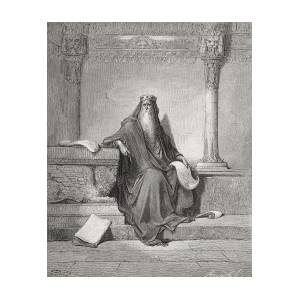
What happens to those who seek God while at the same time deny His existence? Solomon writing from the perspective of an agnostic provides us the answer.
“When I applied mine heart to know wisdom, and to see the business that is done upon the death: (for also there is that neither day nor night seeth sleep with his eyes:) Then I beheld all the work of God, that a man cannot find out the work that is done under the sun: because though a man labour to seek it out, yet he shall not find it; yea farther; though a wise think to know it, yet shall he not be able to find it.” (Ecclesiastes 8: 16-17, KJV)
If you are not open to admitting that the God of the Bible exists (“believe the He is”) and He rewards those who diligently seek Him, then you are condemned to remain in Chair 2.
The second type of individuals sitting in Chair 2 is the group of people who have critically examined the claims of Christ and have categorically refused to believe them. Many of the scribes and Pharisees of Christ’s day were in this group.
It was well known that the Jewish religious leaders of the day, the scribes, Pharisees, and Sadducees, generally relied on works as their measuring rod of righteousness.
They believed that you got into heaven by keeping as many of the commandments as you could. The teaching of Jesus directly contradicted this. By repeatedly hammering on this, Jesus weakened the position of power and esteem these religious leaders held over the general masses of people.
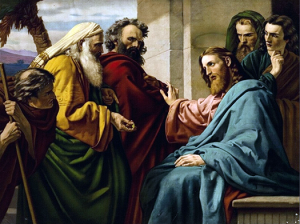
After several futile attempts to trip up Jesus, one of them, a lawyer and expert in the law, asked Jesus the simple question: “What is the greatest commandment?”
Christ’s answer short-circuited their diabolic plan with an ingenious answer. In His response, Jesus declared that:
“Thou shalt love the Lord thy God with all thy heart, and with all thy soul, and with all thy mind. This is the first and great commandment. And the second is like onto it, Thous shalt love thy neighbour as thyself. On these two commandments hang all the law and the prophets.” (Matthew 22:37-40, KJV)
How could anyone argue with this answer? However, it did not provide the inquisitors with a checklist of Dos and Don’ts that could easily be verified.

Jesus, then quickly turned the tables on the Pharisees. He put them on the hot seat by asking an equally simple question: “What do you think about the Messiah? Whose son is He,?” Since they all knew that the Messiah had to be from a descendant of David, the Pharisees immediately responded, “Of course, He is the son of David.”
Jesus, again besting the Pharisees at their own game, quotes the opening lines of a familiar Messianic Psalm of David: “The Lord [God the Father] said unto my Lord [Christ, the Messiah], Sit thou at my right hand, until I make thine enemies thy footstool.” ( Psalm 110:1, KJV)
Then Jesus delivers the coup de gras: “If David calls the Messiah ‘Lord,’ how can the Messiah be David’s son?” The Pharisees had no answer. From that day on, we never see anyone trying to fool Jesus with trick questions.
The scribes, Pharisees, and Sadducees became fully entrenched in their unbelief. They resolutely planted themselves in Chair 2. Does this remind us of the opening verse of the Book of Psalms?
“Blessed is the man that walketh not in the counsel of the ungodly, nor standeth in the way of sinners, nor sitteth in the seat of the scornful.” (Psalm 1:1, KJV)
However, Jesus was not finished with these self-righteous, hypocritical religious leaders. He continues by denouncing them with the extraordinarily strong condemnation:
“Ye serpents, ye generation of vipers, how can ye escape the damnation of hell?” (Matthew 23:33, KJV)
He is essentially saying that their only release from Chair 2 will be a one-way ticket to hell. However, for the seekers, there is still a pathway open to Chair 4, which we will get to momentarily.
The critical examination of one’s own heart and mind on whether to submit to God’s authority did not start with the Pharisees. This conflict began in the heavens with Satan.

Sometime in eternity past, I can picture Satan sitting in Chair 2 intently considering his alternatives. Isaiah gives a glimpse of his thinking of whether to stay in place or cross that vertical timber and to sit in Chair 4.
“How art thou fallen from heaven, O Lucifer, son of the morning! How art thou cut down to the ground, which didst weaken the nations! For thou hast said in thine heart, I will ascend into heaven, I will exalt my throne above the stars of God: I will sit upon the mount of the congregation, in the sides of the north: I will ascend above the heights of the clouds; I will be like the most High.” (Isaiah 14:12-14, KJV)
After he was cast out of heaven, I can imagine that Satan realized his predicament and wanted company. How many times have you heard or voiced the expression: “Misery loves company”?
Satan has repeatedly tempted individuals beginning with Eve and Adam in the Garden of Eden to join him in “wanting to be like gods and know the difference between good and evil.”
Each of us has our own weaknesses. I John 2:16 lists three primary or universal weaknesses: the lust of the flesh (illicit sexual behavior or self-gratification), the lust of the eyes (greed, covetousness, and avarice), and the pride of life (love of beauty and power, without the prerequisite love of righteousness).
Even knowing that Jesus was the Son of God and equal to God, Satan also knew that Jesus was human. The great mystery of the incarnation is that God was “manifested” or appeared in the flesh, human form. Going after what he thought would be Christ’s weakest point, Satan tried to tempt Jesus through His humanity. In Matthew 4:1, we read “Then was Jesus led up of the Spirit into the wilderness to be tempted of the devil.” Jesus was tempted by the devil three times.

The first temptation was to turn stones into bread. It is usually called hedonism. It is the temptation to fulfill one’s hunger for self-gratification. In John’s taxonomy, it is the “lust of the flesh.”
The second temptation was to throw Himself off the pinnacle of the temple because He is so important that God will save Him from harm. This can be labeled egoism. John called it “pride of life.”
The third temptation was to exalt one’s self. This is often called materialism. It is the desire to possess wealth and power, to control the kingdoms of this world. John labeled this the “lust of the eyes.”
After each of these temptations, Jesus answered with the same response. He quoted scriptures by saying “It is written.” He did not succumb to the devil’s enticements. Thus the author of Hebrews could write:
“For we have not an high priest which cannot be touched with the feeling of our infirmities; but was in all points tempted like we are, yet without sin.” (Hebrews 4:15, KJV)
We do not have to be stuck in Chair 2. If we are willing to accept Christ as Lord and Savior, we have an open path to Chair 4. By receiving Jesus as our Savior, we are saved from the penalty of sin. By accepting Jesus as our Lord and fully understanding what that means, we are saved from the power and presence of sin. Individuals who make the move to Chair 4 have ACHIEVED an identity in Christ, I will explain what this means later in this message.
I have reached my self-imposed limit of 2000 words per post in order to make them readable in a reasonable time frame. So far we’ve talked about Chairs 1 (DIFFUSE) and 2 (MORATORIUM). In my next post on Thursday, I will discuss more fully Chairs 3 (FORECLOSED) and 4 (ACHIEVED).

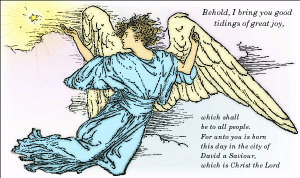

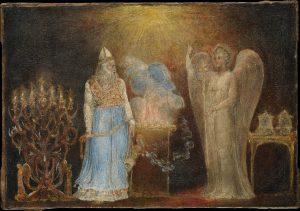
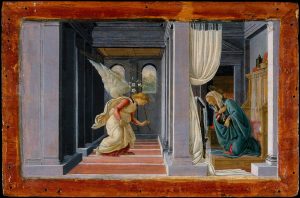
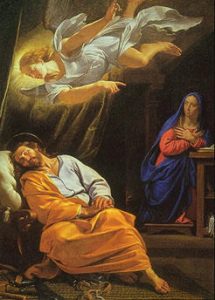


 One notion from Weisel that I found especially thought-provoking explained why people need to watch out when visited by an angel approaching with the words, “Fear not!” Wiesel reportedly once said, “Whenever an angel says, ‘Be not afraid!’, you’d better start worrying. A
One notion from Weisel that I found especially thought-provoking explained why people need to watch out when visited by an angel approaching with the words, “Fear not!” Wiesel reportedly once said, “Whenever an angel says, ‘Be not afraid!’, you’d better start worrying. A 



